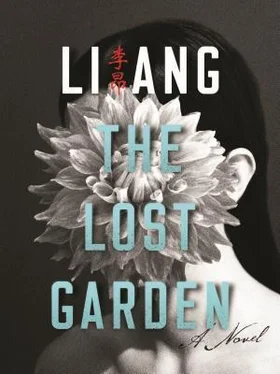Turnip legs were, of course, white. Mudan loved to say that “Keiko’s skin was as white as a Japanese woman and as puffy as a pastry,” and Yinghong would never forget her teacher’s white, round face and her fair, soft, gentle, red-tinged hands.
Turnip legs and the color white, these distinct characteristics of her teacher, formed enduring impressions of Zhu Yinghong’s childhood. Even many years later, they had not gone away.
And that afternoon, as Keiko stood at the rostrum, calling out the names of the students and handing back notebooks with their essays, Yinghong walked up and, as always, kept her eyes fixed on her teacher’s hands so as not to look at her legs; her notebook was clutched in one of those soft, white hands. Suddenly, she heard her teacher abandon herself to loud laughter.
“Zhu Yinghong, so you were born at the end of the First Sino-Japanese War!”
She was laughing so hard she could barely get the words out. Everyone in the class, infected by their teacher’s laughter, started laughing.
“If you were born in the last year of the First Sino-Japanese War, do you know how old you are now?”
Zhu Yinghong shook her head. Tears glistened in her large eyes.
“Go home and ask your papa, and next time watch what you write.”
Keiko forced herself to stop laughing so she could pass out the rest of the notebooks. A red tinge suddenly showed on her fair face, after briefly returning to normal; deep blushes spread out evenly on her snowy white cheeks.
The teacher’s face turned red easily, usually when boys in the class disobeyed her or when girls were arguing. Yinghong, a third-grader, was well aware that in the two years Keiko had been her teacher, this was the only time she had laughed out loud, and she had no idea in the world why her teacher blushed afterward.
By the time Yinghong finally understood that her teacher had blushed owing to embarrassment over a momentary loss of self-control, Keiko had by then chosen marriage over her teaching career and become a mother of five.

That was what he said when he met her for the first time:
“You look like you were born …born in the last century, the end of the last century.”
“Eighteen-ninety-something.”
“That’s about right.”
He nodded, and she was still smiling. Then, without thinking, she blurted out:
“Sort of like I was born in the last year of the First Sino-Japanese War …”

Even if Keiko hadn’t told her to, Zhu Yinghong would have gone home and asked her father. The way her teacher had, uncharacteristically, laughed so hard that afternoon, and then blushed afterward, had humiliated and frightened Yinghong more than at any other time in her life. Always the class leader, the girl with the best grades, she had simply written an essay in which she’d said she was born in the last year of the First Sino-Japanese War, and her teacher and all the students in the class had laughed, followed by the teacher blushing. What had she done? She had to know.
During those years, her father had suffered from poor health. When school was out, she knew that he had probably just gotten up from his afternoon nap and was still at Flowing Pillow Pavilion. Not wanting to wait till she reached Upper House to put down her school bag, she ran, passing under the archway where the words “Lotus Garden” were written in cursive script. At Yinghong Pavilion, she could still read the parallel lines on the red pillars in the late-afternoon sunlight:
At a quiet little garden startled wild geese fly off on the wind
In the fields of green leaves winged guests enjoy stirring up shadowy red
Every time she came to Yinghong Pavilion, she reached out and touched the last two words— ying hong , shadowy red. It was where she’d gotten her name, from this garden and this little pavilion, and even the illiterate Mudan knew that her name and this pavilion were linked.
But on that third-grade afternoon, she was in such a hurry to find her father she ran and skipped all the way to Flowing Pillow Pavilion without stopping to touch “Yinghong” on the pillar for the first time ever.
She pounded on the door with the back of her hand, yet only managed dull, barely audible thuds. Her father had told her she was always to knock before entering his room. It was a heavy, sturdy door, and her little fingers could hardly produce a sound, but he would not permit her to slap the door with her palm, so the only way to make any noise at all was with her knuckles and a shout:
“Is Otosan in?”
“Come in, Ayako.”
Recently, Father had taken to calling her by her Japanese name, Ayako, and had told other members of the family to do the same. Mother, whose fluent Japanese was well known in Lucheng, called out in a lovely soft voice that made her name pleasing to the ear. Mudan was the only one who could never master the language, and usually called out: “Aiya! Kou!” especially when she was out in the yard calling her to come in: “Aiya! Kou!” “Aiya! Kou!” If Yinghong did not want to come when called, she’d have to plug her ears with her hands. Fortunately, Mudan usually forgot even how to “Aiya! Kou!” and simply called out “Ah-hong.”
For as long as she could remember, everyone had called Yinghong “Ah-hong.” Her playmates were Meizi and Wuxiong, for her father had originally banned Japanese names. She had no idea her name was Ayako. But when her schoolmates began using their Chinese names, he took to using Japanese; that went for every member of the family.
“Otosan, I need to talk to you …”
Yinghong pushed on the door, but it didn’t move; it was bolted on the inside. She felt a momentary sense of panic. For some reason, in recent years Father had gotten into the habit of locking doors in the house, and once he did that, there was no way to open them. And he wouldn’t open the door until he was sure who it was.
She was about as tall as most third-graders in public schools, which meant that when she tried the door, she would push at the exact spot of the long wooden bolt on the other side. That presented a formidable obstacle. Had she been taller, say the height of a young woman, she’d have been pushing above the bolt, which would have caused the old door to creak and move a bit.
For years she had been frightened by the prospect of a bolted door, and on the afternoon in question, she tearfully waited for her father to open the Flowing Pillow Pavilion door.
He saw the tears at once and pulled her inside. Between sobs, Yinghong told him about her “born in the last year of the First Sino-Japanese War” essay.
Instead of laughing, as she’d expected, he surprised her by asking sympathetically:
“How do you know about the First Sino-Japanese War?”
“Mudan told me about it. When she tells me stories, she says ‘During the First Sino-Japanese War,’ or ‘Back then, back then it was like this and like that.’ I was born a long time ago, so why can’t I say I was born during the First Sino-Japanese War?”
“Hold on.” Signs of a gentle smile creased Father’s face. “A moment ago, you said the last year of the First Sino-Japanese War, that you were born during the First Sino-Japanese War. But do you know what ‘last year’ means?”
Knowing how her father doted on her, Yinghong said confidently:
“The last year? That means I was born last, later than Mudan and later than Otosan.”
Father had a good laugh over that, a rarity in recent years. He got up out of his carved sandalwood bed, and walked up to put his arms around her, having to bend over to do so, since he was so much taller. She recoiled briefly when his beard touched her face, but then quickly leaned back toward him. Father took her over to a bedside table, where he picked up a thick Japanese book and, without even opening it, began:
Читать дальше













